US President Donald Trump has said he would talk with Congress about how to fund what will be a very expensive recovery from Hurricane Harvey as deadlines loom on the US budget and federal debt ceiling.
It is unclear how the hurricane relief will impact budget talks in Washington. Mr Trump has threatened a government shutdown over the budget unless lawmakers include funding for his proposed border wall with Mexico.
Speaking to reporters in the Oval Office, Mr Trump lauded the efforts by Texans to extract storm victims from flooded areas of Houston and beyond after record amounts of rainfall from Hurricane Harvey.
"We're dealing with Congress. As you know it's going to be a very expensive situation," he said.
Mr Trump will visit Texas tomorrow. He said he might return on Saturday and could stop in Louisiana where the storm is now dumping rain.
Mr Trump, who has presided over a number of Cabinet meetings to help coordinate the federal response, said "things are being handled very well" and he hailed the relief effort.
"It is a historic amount of water. There's never been anything like it. So the people are handling it amazingly well and the people of Texas as you know have really persevered. And when you watch the spirit and the enthusiasm and helping each other and the teamwork, it's really been something," he said.
A driver was rescued after becoming trapped inside his car at a flooded road in Houston, Texas pic.twitter.com/rSYk5yATSz
— RTÉ News (@rtenews) August 28, 2017
Emergency management officials said they were committed to getting federal resources to Texas as quickly as possible to help with the flooding, with more than 450,000 people likely to seek assistance.
Federal Emergency Management Agency Administrator Brock Long said more than 30,000 people were expected to be placed temporarily in shelters after the storm made landfall over the weekend.
As of this morning, Harvey was hovering on the Gulf coast of Texas, about 160km southwest of Houston.
It was expected to start moving towards the northeast tomorrow, bringing heavy rains through Friday to already inundated parts of east Texas and into neighboring southwestern Louisiana.
Mr Trump declared an emergency in Louisiana as part of the southern state was being pelted with rain.
Houston mayor Sylvester Turner said there are around 5,500 people in emergency shelters, but he expected that figure to increase "exponentially".
The city's police chief said 2,000 people have been rescued and emergency services have received around 6,000 calls for emergencies and rescues.
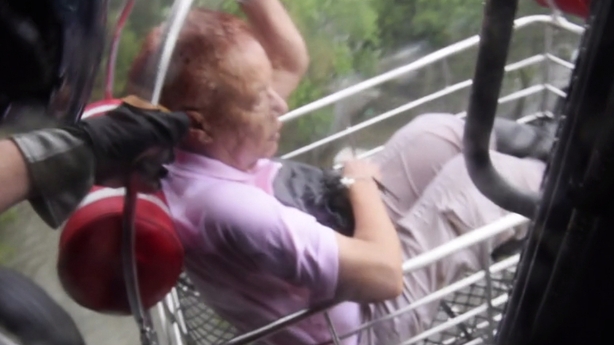
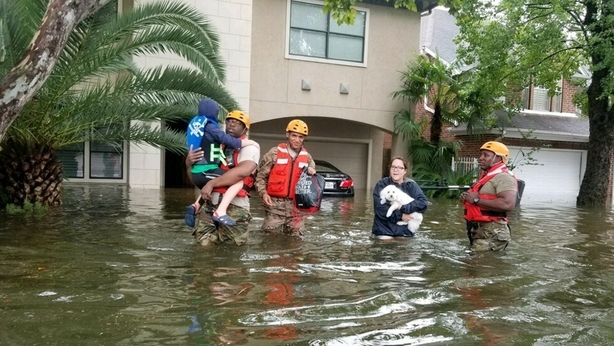
Art Acevedo said people are retrieving people trapped in flooded homes and cars and there are around 185 requests outstanding for critical rescues.
Meanwhile, the US Army Corps of Engineers is starting to release water from two Houston-area reservoirs, which will cause flooding of homes in the surrounding communities, because the reservoirs have risen too quickly.
Read More:
- Carlow teen in US for cancer treatment caught up in floods
- In Pictures - Texas floods
- Over 1,000 people rescued as Harvey floods Houston
The Corps of Engineers said it needs to release water now to prevent uncontrolled water flowing from the dams.
Water is being released from the Addicks and Barker reservoirs into Buffalo Bayou, the primary body of water running through Houston.
"If we don't begin releasing now, the volume of uncontrolled water around the dams will be higher and have a greater impact on the surrounding communities," said Col Lars Zetterstrom, Galveston District commander of the Corps.
The release was expected to start flooding homes around the reservoirs this morning, the Harris County Flood Control District said.
Harvey came ashore late on Friday as the most powerful hurricane to hit Texas in more than 50 years and has killed at least two people.
IMPORTANT: If you are awaiting rescue, hang a towel or sheet prominently so we can find you. Adresses are hard to spot. #harvey #hounews
— HCSOTexas (@HCSOTexas) August 28, 2017
Schools, airports and office buildings in Houston were ordered shut as scores of roads were turned into rivers by floods and chest-high water filled numerous neighbourhoods in the low-lying city.
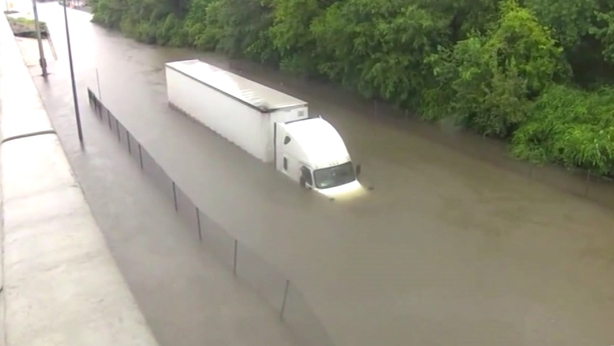
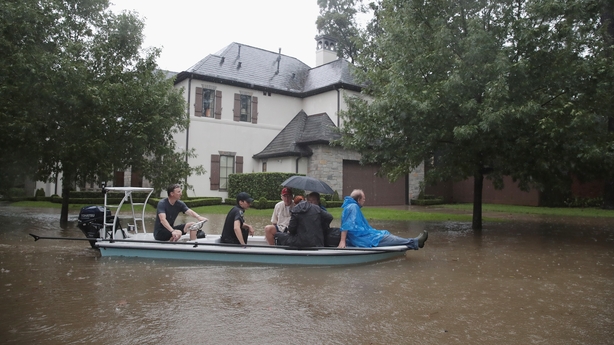
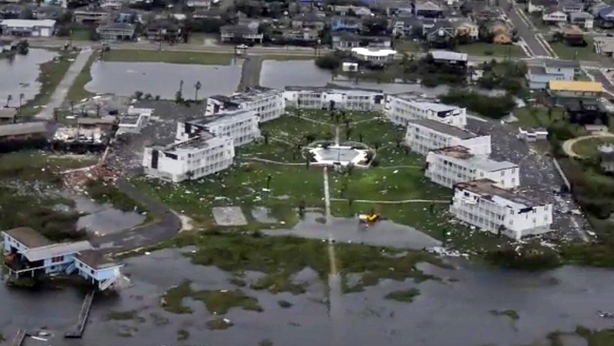
Torrential rain from Harvey hit areas more than 240km away, swelling rivers upstream and causing a surge that was heading toward the Houston area.
More than 50,000 people were ordered to leave parts of Fort Bend County, about 55km southwest of Houston, as the Brazos River is set to crest at a record high of 18m this week, 4.3m above its flood stage.
Brazos County Judge Robert Hebert told reporters the forecast crest represents a high not seen in at least 800 years.
Steve Bowen, chief meteorologist at reinsurance firm Aon Benfield, said: "What we're seeing is the most devastating flood event in Houston's recorded history. We're seeing levels of rainfall that are unprecedented."
Photo of elderly residents trapped in a flooded nursing home went viral on social media prompting their rescue #StormHarvey pic.twitter.com/SuwwrBZxgM
— RTÉ News (@rtenews) August 28, 2017
Total precipitation could reach 127cm in some coastal areas of Texas by the end of the week, or the average rainfall for an entire year, forecasters have said.
The US president plans to go to Texas tomorrow to survey damage from the storm, a White House spokeswoman said yesterday.
Mr Trump, facing the first big US natural disaster since he took office in January, signed a disaster proclamation on Friday, triggering federal relief efforts.
Texas Governor Greg Abbott said yesterday 54 counties had been declared state disaster areas and he plans to add 1,000 more National Guard personnel to the flood battle.
The Harris County Sheriff's Office rescued more than 2,000 people in the greater Houston area using vehicles including motorboats, airboats and humvees, a spokesman said.
The US Coast Guard and Houston police rescued hundreds more as residents brought boats to staging centres to help.
All Houston port facilities were closed today because of the weather threat.
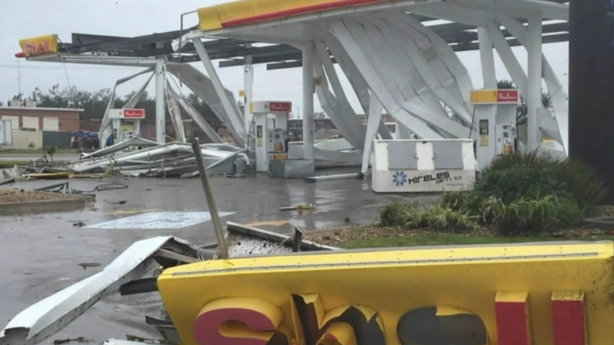
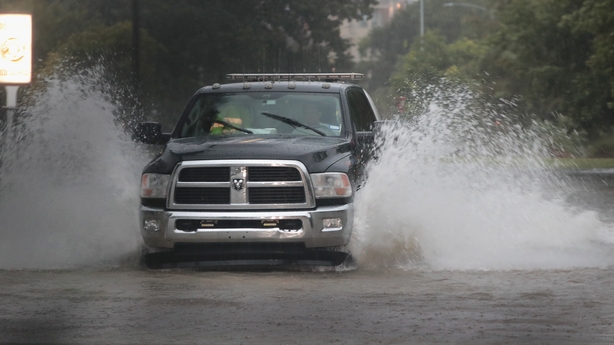
More than 220,000 customers in the Houston area are without power, utilities Center Point Energy and AEP Texas said last night.
Houston's George Bush Intercontinental Airport, one of the nation's busiest, and William P Hobby airport halted all commercial flights yesterday.
The airports remain closed to commercial traffic today.
Forecasters could only draw on a few comparisons to the storm, recalling Hurricane Katrina, which devastated New Orleans and killed 1,800 people in 2005.
Katrina resulted in more than $15 billion in flood insurance losses in Louisiana and Mississippi.
Flood damage in Texas from Hurricane Harvey may equal that from Katrina, the costliest natural disaster in US history, an insurance research group said yesterday.

